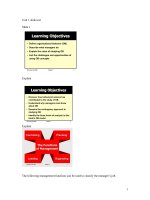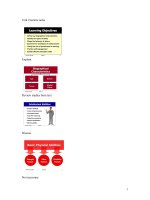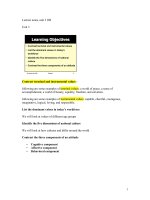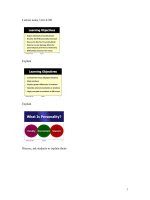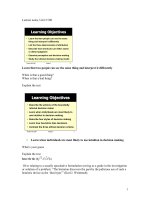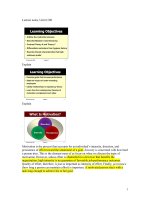Organizational behavior: Lecture 40 - Dr. Mukhtar Ahmed
Bạn đang xem bản rút gọn của tài liệu. Xem và tải ngay bản đầy đủ của tài liệu tại đây (762.59 KB, 48 trang )
Organizational
Behavior
(MGT-502)
Lecture-40
Summary
of
Lecture-39
What is Stress?
Three key factors determine
the likelihood of stress
–Importance: How significant the event is
to the person?
–Uncertainty: Degree of clarity over what
will happen?
–Duration: Length of time the demands
remain in place
A Model of Stress
Is stress good
or bad?
Inverted-U Relationship between
Stress and Job Performance
Today’s Topics
Consequences of Stress
High Levels
of Stress
Physiological
Symptoms
Psychological
Symptoms
Behavioral
Symptoms
Recognizing Stress
• Short-term physical symptoms
• Long-term physical symptoms
• Internal symptoms
• Behavioral symptoms
Short-Term Physical
Symptoms
• Faster heart beat
• Rapid Breathing
• Increased sweating • Tense Muscles
• Cool skin
• Dry Mouth
• Cold hands and feet • A desire to
urinate
• Feelings of nausea,
or 'Butterflies in
stomach'
• Diarrhea
Long-term Physical
Symptoms
• Change in appetite –Headaches
• Frequent colds
–Aches and pains
• Illnesses such as: –Feelings of
–Asthma
–Back pain
–Digestive problems
intense and longterm tiredness
Internal Symptoms
• Worry or anxiety
• Confusion, and an inability to concentrate or
make decisions
• Feeling ill
• Feeling out of control or overwhelmed by
events
• Mood changes:
– Depression
– Frustration
– Hostility
• Helplessness
• Restlessness
• Being more lethargic
• Difficulty sleeping
• Drinking more alcohol and smoking more
• Changing eating habits
• Relying more on medication
Behavioral Symptoms
• Talking too fast or too loud
• Fiddling and twitching, nail biting, grinding teeth,
drumming fingers, pacing, etc.
• Bad moods
• Being irritable
• Defensiveness
• Being critical
• Aggression
• Irrationality
• Overreaction and reacting emotionally
• Reduced personal effectiveness
• Being unreasonably negative
• Making less realistic judgments
• Being unable to concentrate and having
difficulty making decisions
• Being more forgetful
• Making more mistakes
• Being more accident prone
• Changing work habits
• Increased absenteeism
• Neglect of personal appearance
Chemical and Nutritional Stress
• Caffeine-raises levels of stress
hormones
• Sweets or chocolate-causes body
to release too much insulin
• Salt-raises blood pressure
• Unhealthy diet-leads to illness
which increases stress
Lifestyle and Job Stress
• Too much or too little work
• Having to perform beyond your experience or
perceived abilities
• Having to overcome unnecessary obstacles
• Time pressures and deadlines
• Keeping up with new developments
• Changes in procedures and policies
• Lack of relevant information, support and advice
• Lack of clear objectives
• Unclear expectations of your role
• Responsibility for people, budgets or
equipment
• Career development stress:
– Under-promotion, frustration and boredom with
current role
– Over-promotion beyond abilities
– Lack of a clear plan for career development
– Lack of opportunity
– Lack of job security
• Stress from your organization or your clients.
• Personal and family stresses.
Environment and Job Stress
• Your working environment can cause stress
– Crowding or invasion of personal space
– Insufficient work space
– Noise
– Dirty or untidy conditions
– Pollution
– Other environmental causes
Fatigue and Overwork
• Stress builds up over a long time
• Trying to achieve too much in too
little time
• “Hurry Sickness”-vicious circle of
stress causing you to hurry jobs and
do them badly.
Long-Term Stress
Performance
Healthy Tension
Fatigue
Exhaustion
ILL HEALTH
BREAKDOWN
Stress
How to Manage
Stress?
Optimum Stress Levels
Performance
Too
Ideal
Little
Range
Stress Levels
Too Much
Stress Management
&
Prevention

